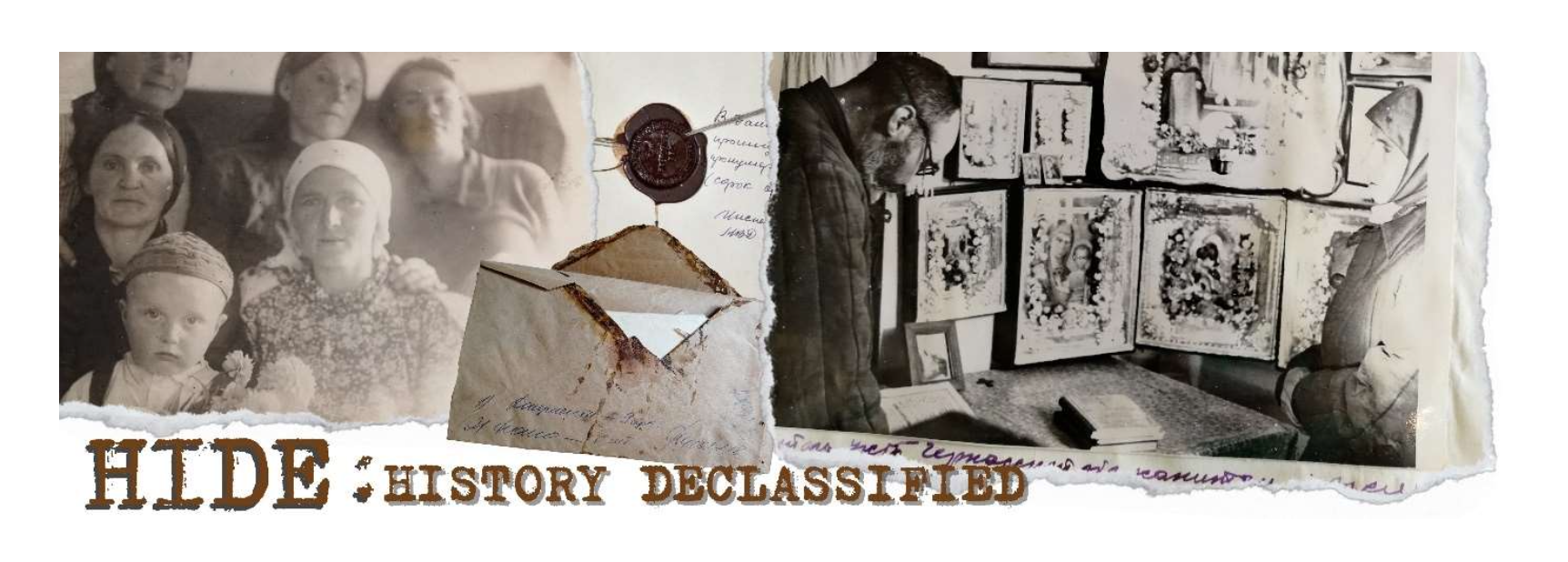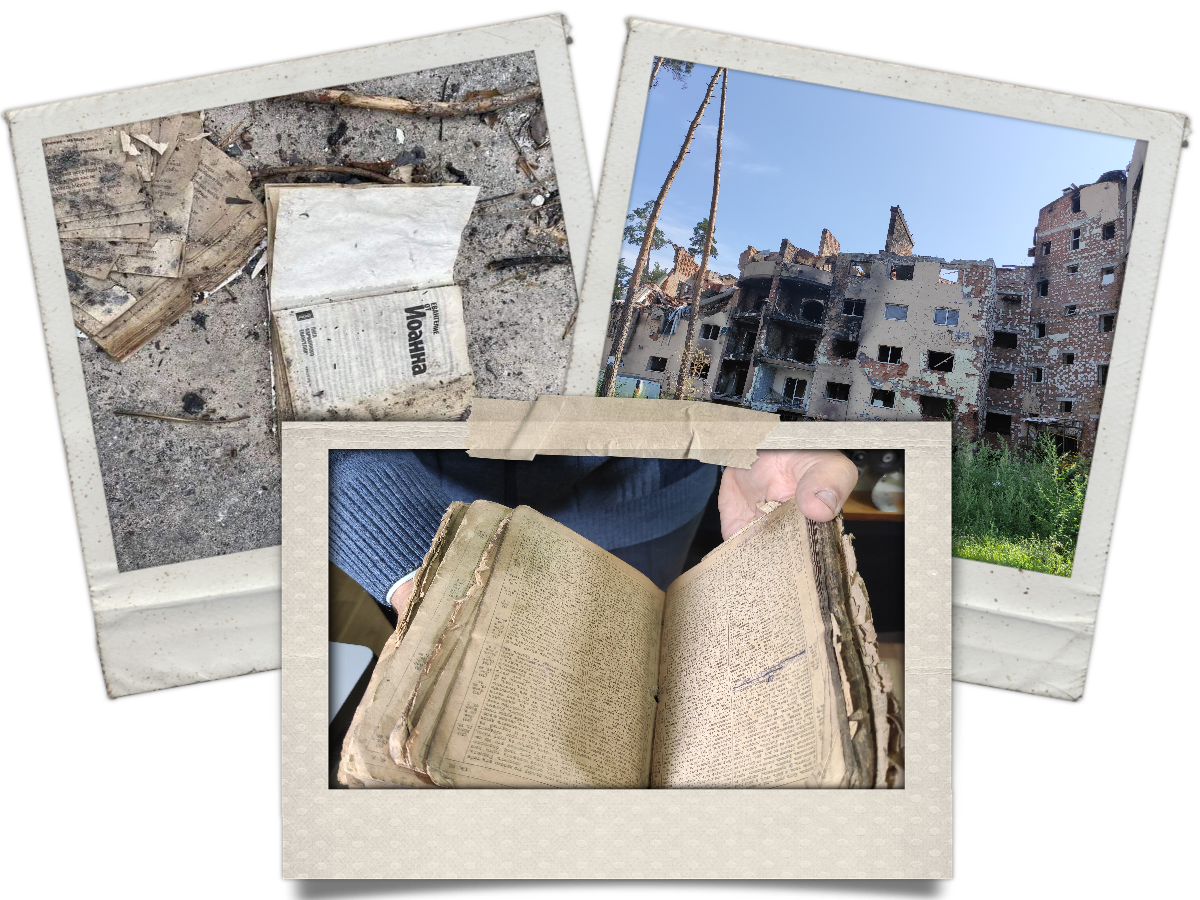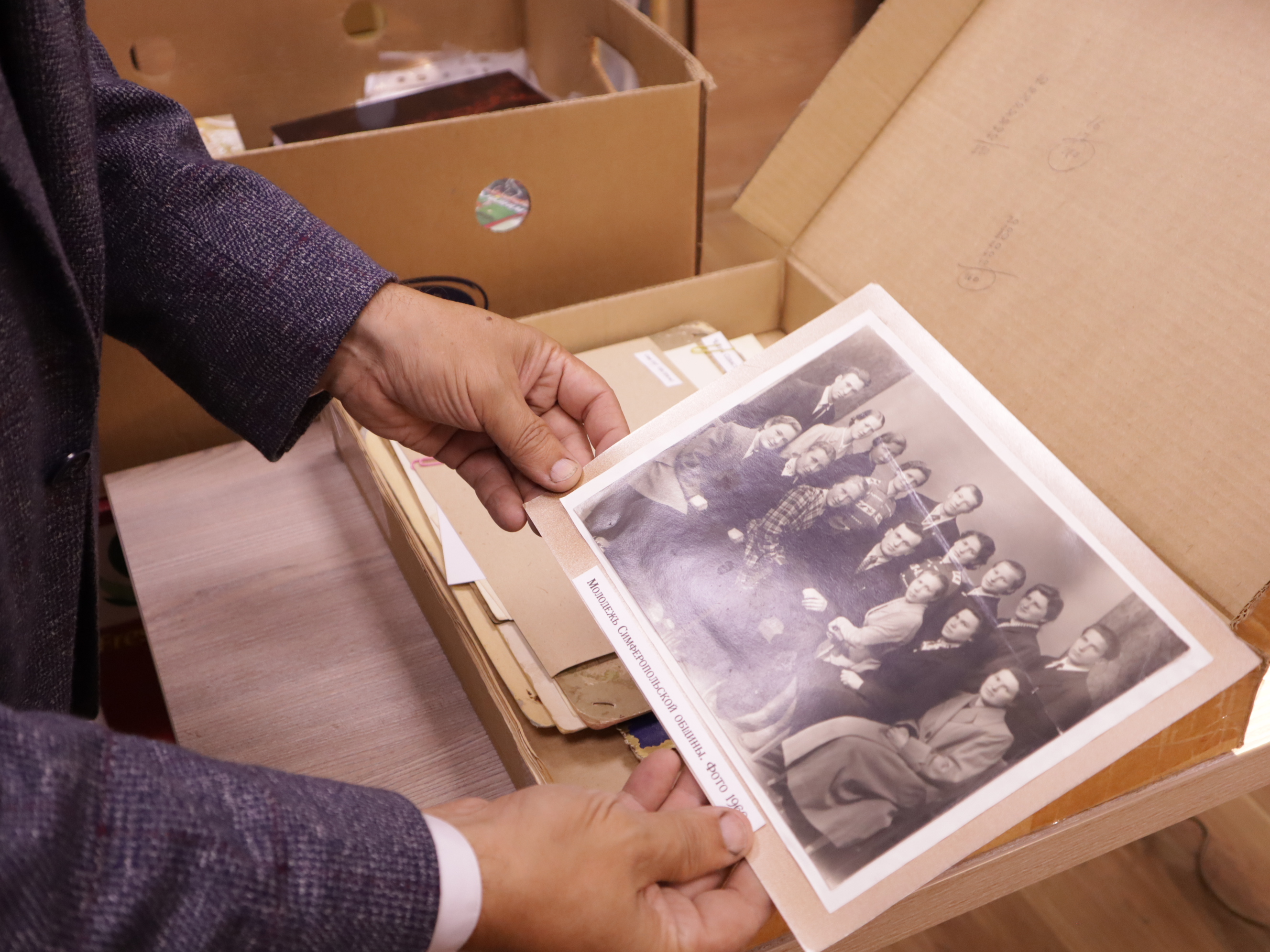In This Section

History Declassified Project: Endangered Archives and the War in Ukraine
The Challenge
The war in Ukraine has reshaped our perception of historical heritage and legacy, starkly reminding us that Europe rests on the legacy of totalitarian regimes. As the ongoing conflict ravages museums and archives, it also reveals the tangibility and hidden power of historical memory, transforming it into a battleground of contemporary political struggle. Archives become contested sites of power, memory, and historical agency.
The History Declassified project is a community-engaged initiative dedicated to preserving the voices and narratives of silenced and marginalized communities amidst of destruction and “memory wars.” We save, digitize, and ensure long-term preservation of minority and local community archives in wartime Ukraine. We also strive for public access to previously classified Soviet regime archives, revealing the state’s violence and persecution of minority groups.
Amidst the turmoil, these archives stand as silent witnesses to the past, repositories of stories, traditions, and identities that are in danger of being lost forever. The archives in focus have faced relocation, smuggling, destruction, or concealment, reflecting their shared history deeply rooted in Soviet-era repression and discrimination. This legacy continues to shape these communities and their archives today, as they seek to confront past injustices and respond to the present crisis.
The preservation of endangered archives is not merely an act of archival work; it is a vital tool for community activism amidst war, empowering communities to reclaim their narratives and histories, particularly for religious minority groups advocating for their rights amid conflict. While these archives may not end the war or reconcile the past, their rescue, preservation, and public sharing offer hope for shaping Ukraine’s present and future, fostering peacebuilding and reconciliation through grassroots activism and historical research.
The Research
History Declassified takes a community-engaged approach, offering a unique perspective on recently declassified Soviet regime archival collections and local community archives in war-time Ukraine. It combines interdisciplinary methodologies such as anthropology of religion, oral history, archival methods, and digital humanities.
Preserving Ukraine’s Historical Heritage: Archival Conservation and Digitization
- Endangered community archives: Rescuing and digitizing nearly 500,000 endangered archival documents in Ukraine.
- Soviet regime archives: Digitizing and ensuring public access to previously classified materials from the Soviet secret police (KGB) archives in Ukraine, in collaboration with the State Archives of the Security Service of Ukraine.
Oral History and Storytelling
- Ethnographic engagement and oral history research with minority religious communities in Ukraine persecuted by the Soviet totalitarian regime, shedding light on their experiences and resilience in the face of oppression.
- Gathering oral history interviews and eyewitness accounts from local communities in Ukraine, recounting grassroots wartime initiatives to save archives and preserve historical heritage in times of conflict.
- Documenting war crimes targeting cultural heritage in Ukraine (including the 2022 occupation and massacre in Bucha), featuring photos, videos, and recorded eyewitness accounts.
Multimedia Digital Exhibition and Archive
- Creation of an open-access digital platform to provide broad public access to previously classified information, amplifying the voices of repressed and marginalized groups. Through textual materials, photos, videos, and oral history interviews, it reconnects communities with their past, presenting narratives under totalitarian regimes and amid Ukraine’s ongoing conflict.
Partnerships
- Partnering with national and international NGOs, faith communities, academic and archival institutions in Ukraine, Ireland, UK, USA, and Canada to collectively preserve endangered historical heritage in war-torn Ukraine.
- Sustaining dialogue with the Heritage Emergency Response Initiative and National Council for the Recovery of Ukraine from the War.
“We save souls, she saves history amidst the war. This initiative is as timely as fresh air.”

The Impact
At the heart of grassroots peacebuilding efforts in war-torn Ukraine, this collaborative initiative serves as a cornerstone for community activism, fostering sustainable reconciliation, and activating minority communities to lead the peace process from within. It catalyzes active participation and engagement among local communities, civil society organizations, and individuals affected by conflict.
Amidst the turmoil of war, local community archives have transcended their traditional role as mere repositories, emerging as powerful tools for activism and memory. They empower marginalized voices, reshaping historical narratives to process past traumas and pave the way for healing in the present. This process underscores the crucial role historical narratives play in navigating enduring legacies and wartime traumas in Ukraine.
Furthermore, the History Declassified project aims to bridge Ukraine’s historical legacy with contemporary concerns of enlarging Europe, addressing cultural pluralism, social exclusion and marginalization of minority groups. With Ukraine’s European integration, the questions arise on how its cultural and political patrimony (including the historical lessons of political repression and violence) can be reconceptualized in order to reduce inequalities and social exclusion in the future of Europe.
Research and Innovation
One of the primary outcomes is the creation of an open-access multimedia History Declassified Digital Exhibition and Archive. It will provide a sanctuary for endangered archival collections, housing also previously untapped Soviet regime archival collections, oral history accounts, ethnographic data, and eyewitness testimonies spanning Ukraine’s 20th and 21st centuries, including the period of the current war.
Digital Humanities Best Practices: Through the integration of advanced video and digital technologies such as Virtual Reality, Augmented Reality, and 3D visualization, our aim is to enhance accessibility and interactivity with historical materials, fostering deeper understanding and wider public engagement with Ukraine’s cultural heritage. Additionally, we implement innovative preservation and archiving methods to safeguard fragile records, thereby contributing to the long-term preservation of cultural heritage for future generations.
Communicating Research for Public Policy Making
We foster public debates in Ireland and Ukraine on transitional justice, truth recovery, and pathways to reconciliation in conflict-affected societies. By establishing a cross-cultural dialogue platform, the History Declassified project explores innovative approaches to address traumatic pasts, including Soviet repression’s legacy, and its impact on present politics. Our multidisciplinary approach facilitates dialogue among researchers, archivists, communities, civil society, and policymakers, shedding light on the impact of historical legacies of totalitarianism and political repression on community cohesion.
The project’s outcomes foster cross-sectoral collaboration, providing insights for human rights organizations and policymakers to address historical legacies and past injustices. By promoting dialogue and facilitating bottom-up peacebuilding and reconciliation efforts in conflict zones, it seeks ways to achieve sustainable conflict resolution and community healing.
- Policy brief on the importance of open access to formerly classified records from the Soviet regime for peacebuilding, cultural pluralism, and preventing social exclusion in Europe.
- Public exhibition “History Declassified: Narratives of Resilience from the Soviet era to War in Ukraine” (to be held in Washington DC and Kyiv).
- Dissemination through platforms with wider audiences: podcasts BBC Dan Snow's History Hit; Pat Kenny Show; The Eurasian Knot; two op-eds in Irish Independent, and open lectures.
- Production of a short documentary film “Saving Vulnerable Past: Endangered Archives and the War in Ukraine.”
Community photograph of a clandestine religious group in Soviet Ukraine. Source: Adventist Museum- Archive in Bucha.
Sanctuary Initiatives
Our initiatives extend support to displaced Ukrainian scholars and activists amidst the war. Upholding UCC’s commitment as a university of sanctuary, we have forged employment opportunities for Ukrainian scholars and young researchers. This includes one PhD fellowship, two UCC Sanctuary Fellowships, one funded research assistant through the IRC Fellowship Ukrainian Scheme, and four funded research assistants on site in Ukraine.
For More Information
This project is funded by the Irish Research Council through the SFI-IRC Pathway Programme and by the British Library Endangered Archives Programme and is led by Dr Tatiana Vagramenko (UCC Future Humanities/ Study of Religions).
- Follow the project on our website: https://www.ucc.ie/en/history-declassified/
- Our initiative supported by the British Library: http://eap.bl.uk/project/EAP1511
College of Arts, Celtic Studies & Social Sciences
Coláiste na nEalaíon, an Léinn Cheiltigh agus na nEolaíochtaí Sóisialta
Contact us
College Office, Room G31 ,Ground Floor, Block B, O'Rahilly Building, UCC

